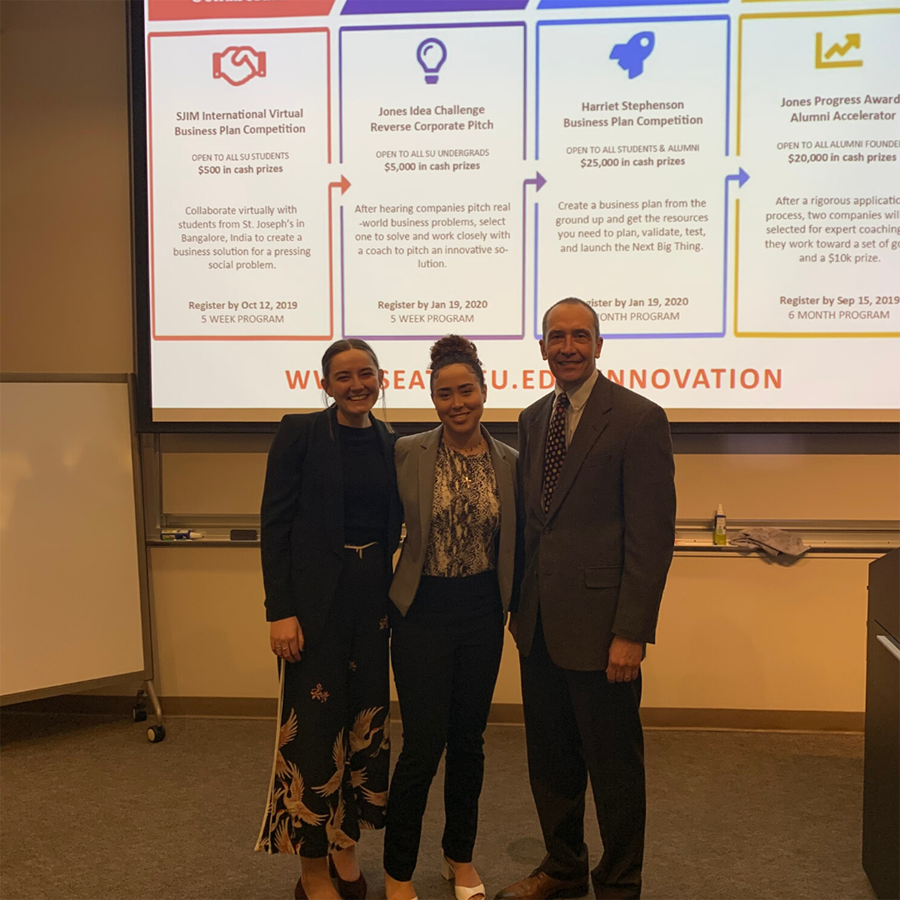On Friday, February 28, sixteen student teams participated in the inaugural Jones Idea Challenge Corporate Reverse Pitch program. Funded by the Herbert B. Jones Foundation, the Jones Idea Challenge program challenges undergraduate entrepreneurial-driven students to solve real company problems. Student teams work with a team business coach and compete for $5,000 in cash prizes. By the end of the program, the Jones Idea Challenge produces innovative student solutions for real business problems.
Congratulations to Sharon Ideguchi and Veronica Garcia for taking home the grand prize this year!
Giving Tech Labs presented the problem that survivors don’t have convenient access to a platform that provides them with resources to seek the help or assistance they need. Team Sheronica designed a widget that offers personalized resources through simple user experience and using empowering language. Their widget is easily accessible on all devices and can be accessed easily through a QR code, the internet, or text message.
Here is a bit more about their solution and the program experience in Sharon’s own words:
- What made you decide that you wanted to participate in the Jones Idea Challenge?
- Amelia Marckworth came to Veronica and I's Sport and Entertainment Marketing class and told us about the competition. As soon as she was done explaining the challenge, Veronica and I made eye contact across the classroom and just nodded in agreement. We definitely wanted to be part of the program. It seemed like a great way to test our business acumen and apply it to a situation that would help someone.
- In one to two sentences, tell us about your solution.
- We created an online widget that used sentiment analysis and machine learning to efficiently and effectively match sexual assault survivors with the right resource to best help them on their journey. We had a particular focus on linguistic application as well to make sure we used empowering and thoughtful language throughout the widget.
- Out of all the problems and companies, what drew you to Giving Tech Labs?
- Giving Tech Labs had a problem that we felt we could both apply our expertise and had pitched a problem we felt passionately about. I believe the only business worth doing is the business that helps someone live a better and more empowered life. Giving Tech Labs allowed us to do that. As soon as they were done presenting, I knew that was the company for us.>
- This year's theme was 'Tech for Social Impact.' In what ways can technology help solve societal issues?
- I think there is a stigma around technology as a resource. Many people believe that technological resources are for the entitled. In a lot of ways, that's true. However, as more and more companies like Giving Tech Labs use its resources to apply technology to social challenges, I see the rhetoric around technology changing. Technology can improve every aspect of our lives and, whether it's routing excess food to the people who need it most, or, programming an AI to identify people in distress; technology can solve problems that we've been facing for generations.
- What were some of your biggest challenges in this challenge? How did you overcome them?
- Our biggest challenge was making sure that we were creating both an effective and thoughtful project. Our number one concern was making sure we were doing the sexual assault survivor community justice in our project. The community was the most important component of the whole experience. This meant a lot of doubting ourselves and our knowledge of the survivor journey. Consequently, we researched and listened more. Our doubt made us more thoughtful and overall created a better project that could actually help someone.
- What were the most rewarding aspects of the challenge?
- The most rewarding aspect of the challenge was that we were part of a bigger movement to help those in need. After the competition, a representative from Giving Tech Labs let us know that she was interested in using our idea around sentiment analysis. Knowing that we were contributing to a real-world project which would help people was so rewarding. It was the reason we got involved in the first place.
- How did you work with your team coach?
- I will admit when we were assigned a coach, I was worried that they would write us off because we were too young or women in business. However, Michael encouraged us every step of the way. He was an AMAZING team coach. We couldn't be happier with our experience. From our first meeting, Michael made it clear that he was here to help us achieve what we wanted to achieve instead of just telling us what to do. I can't even count how many times throughout the process we thanked him for being so supportive. Overall, Michael was the best cheerleader, mentor, friend, and coach a team could ask for. We were so proud to be his team.
To learn more about the Jones Idea Challenge in general check out this blog post.
To learn about the other 2020 Jones Idea Challenge winners check out this blog post.

